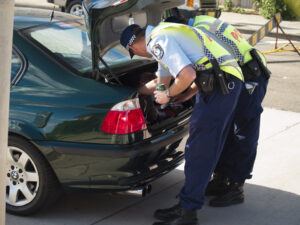When Can Police Make a Search Without a Warrant?
The Fourth Amendment to the U.S. Constitution protects citizens against “unreasonable search and seizure” and sets basic requirements for a warrant based “upon probable cause, supported by Oath or affirmation, and particularly describing the place to be searched, and the persons or things to be seized.” But it’s important to know that police don’t always need a warrant for their search to be reasonable and therefore lawful.
What are the four reasons police can search without a warrant?
There are four basic exceptions to the requirement for police to get a warrant before performing a search:
- Consent — If you freely and voluntarily agree to a search, you must think it’s reasonable, right?
 So, if the police want to search your car or your home and you say, “Have at it,” you can’t complain later that they didn’t have a warrant. However, you cannot consent to a search of someone else’s property. So, if you have a co-tenant, you can only consent to a search of the common area and your own private area of the residence.
So, if the police want to search your car or your home and you say, “Have at it,” you can’t complain later that they didn’t have a warrant. However, you cannot consent to a search of someone else’s property. So, if you have a co-tenant, you can only consent to a search of the common area and your own private area of the residence. - Plain view — This doctrine basically says that if a police officer can see evidence of a crime out in the open, he has the right to seize it. What constitutes the plain view of the officer, however, is often a matter of dispute. For example, an officer who looks through the driver’s side window of a car and sees a marijuana baggie on the front passenger seat is simply being reasonable in the performance of duties. An officer who sticks his head in the window and looks around the interior of the cabin may be overstepping his bounds.
- Search incident to arrest — If you are arrested for any crime, the police have the right to make a search of your person to uncover a weapon you might use against them or evidence you might want to destroy. Under certain circumstances, police could also make a sweep of accomplices.
- Exigency — In an emergency situation, the police can act without delaying to get a warrant. If there is a threat to public safety, or if suspects are going to destroy evidence, the police can enter a premises without a warrant.
If your circumstances do not fall under any of these exceptions, you have the legal right to refuse a warrantless search. Under some circumstances you might want to grant permission, but asserting your Fourth Amendment right is generally the safest course.
The Giatras Law Firm, PLLC protects the constitutional rights of criminal defendants throughout West Virginia. Call us for a free consultation, or contact our Charleston office online.
